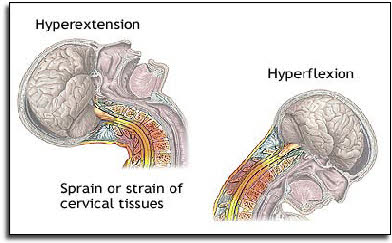After automobile accident an injury may not become apparent until months or even years after the incident. |
| Look for these symptoms after an auto accident:
|
When a vehicle stops suddenly in a crash or is struck from behind, a seat belt will keep a person's body |
|
| from being thrown forward. But the head may snap forward, then backward, Whiplash Whiplash is a soft tissue injury of the neck caused by a sudden jerking or of the neck beyond their normal range. In severe cases inter vertebral joints, discs, and nerve roots may be affected. |
 |  | ||||
 |
|
 | |||
 |  |
Call immediately for medical assistance if
|
The information provided on this site is not a substitute for professional medical advice, examination, diagnosis, or treatment. Always seek the advice of a qualified health care provider with any questions you may have regarding a medical condition. If you think you may have a medical emergency, call your doctor or 911 immediately. |
























